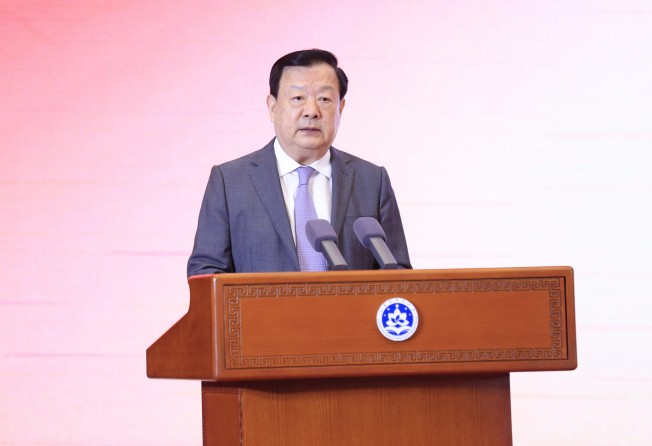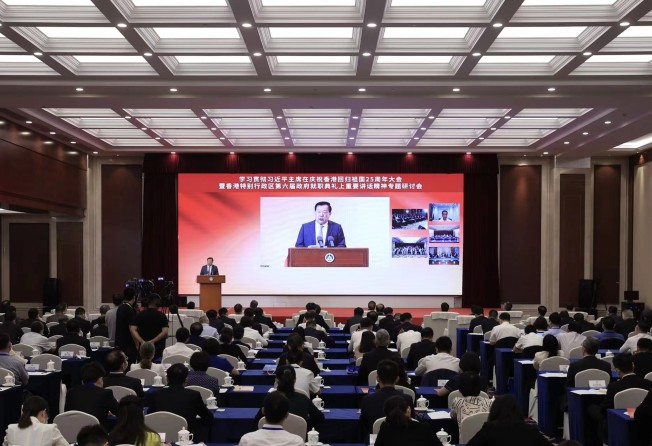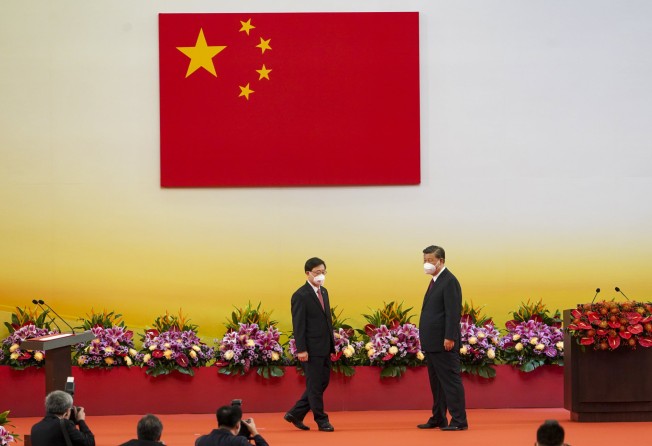
Focus on solving ‘immediate, prominent and urgent problems’, top Beijing official says to new Hong Kong government
- Xia Baolong, director of State Council’s Hong Kong and Macau Affairs Office, addresses seminar in Beijing on President Xi Jinping’s July 1 speech in city
- ‘We must resolutely clamp down on all anti-China forces that destabilise Hong Kong and Macau,’ he says

A top Beijing official overseeing Hong Kong affairs has urged the new government to live up to people’s expectations and focus on solving the most “immediate, prominent and urgent problems”, while warning residents to remain vigilant against anti-China forces seeking to destabilise the city.
Xia Baolong, director of the State Council’s Hong Kong and Macau Affairs Office, made the remarks in a keynote address on Monday morning at a seminar in Beijing which aimed to further elaborate on a speech Chinese President Xi Jinping gave on July 1 at a ceremony to mark the 25th anniversary of the city’s return to Chinese sovereignty.
“We must resolutely clamp down on all anti-China forces that destabilise Hong Kong and Macau and leave no crack in the process,” Xia said. “We must resolutely launch struggles against external forces in the United States and the West.”

The president set out his vision for Hong Kong’s future direction in the clearest terms yet and listed his “four expectations” for the new administration, telling officials to improve governance, strengthen the momentum of development, solve deep-seated livelihood issues and ensure harmony as the city “cannot afford any chaos”.
Xia said the president’s speech provided “a strong, practical guiding role for good governance in the city” and the local government should change its concept of administration. It had to improve its governing style, strengthen foundations and establish an administration that could lead Hong Kong and Macau to fully develop and be able to do “practical things” for the public.
“The government must effectively respond to the expectations of the people, and focus on solutions that can alleviate difficulties facing the public,” he said.
Xia cited Xi’s “full support” for the development in Hong Kong, saying it was a “big gift package” from the central government which empowered the city to enhance efficiency and fully meet the actual needs of its long-term development.
Xi earlier mentioned central authorities’ full support for the city to align with national strategies, such as the 14th five-year plan, and develop more extensive exchanges and cooperation with the world, as well as unleash the creativity and vitality of society.
At Monday’s forum, Xia also emphasised that only “patriots” could administer the city, while all residents should remain vigilant over destabilising anti-China forces in Hong Kong and Macau, as “they will not die down”.
“External forces in the United States and the West will not be reconciled and may counter-attack at any time,” he said.
The Beijing official also further elaborated on Xi’s long-term commitment to maintaining the “one country, two systems” governing principle for Hong Kong, saying the solemn declaration “fully demonstrates the historical confidence and rock-solid will” of the central government to unswervingly implement it.
“The formulation and implementation of the national security law for Hong Kong, revising and overhauling Hong Kong’s electoral system, while fighting against anti-China chaos in Hong Kong and Macau, and the external forces behind the United States and the West, are all to ensure one country, two systems remains unchanged,” he added.
Xia said all Beijing had done was to defend the rule of law, democracy, human rights, freedom and the well-being of all Hong Kong and Macau residents.
“Anyone who dares to challenge the bottom line of one country, two systems at any time, and dares to oppose China and disrupt Hong Kong and Macau will be severely punished,” he warned.
Xia also made it clear that “one country” was not something abstract. It was the People’s Republic of China, which practised a socialist system, he said.
“The leadership of the Chinese Communist Party is the most essential feature of ‘socialism with Chinese characteristics’. All residents of the [Hong Kong and Macau] special administrative regions should consciously respect and safeguard the fundamental system of the country,” he said.
The forum was held in Beijing, Hong Kong, Shenzhen and Macau. Organised by the semi-official Chinese Association of Hong Kong and Macau Studies think tank, officials and politicians attended the event in their own cities, and the closed-door discussions were broadcast live at all four venues.
On the role of the Communist Party, Chief Executive John Lee Ka-chiu said: “Hong Kong people should respect it with self-awareness.”

He stopped short of directly responding to questions on whether Xia’s remarks were to remind the city to legislate as quickly as possible its own security bill as required under Article 23 of the Basic Law, the city’s mini-constitution. Lee has only said his government was taking the time to study national security laws elsewhere to come up with one that could handle “all risks imaginable and foreseeable”.
Lee, after attending the seminar, also said the one country, two systems principle need not change, according to Xia and Xi, as Hong Kong continued to build on its “unique position”.
He said issues of diplomacy and national security were Beijing’s territory, but the central government could also provide guidance on areas such as housing, the economy and elderly care, aspects that fell under Hong Kong’s high degree of autonomy.
Lee said he would deliver his policy address in October, pledging to listen to people’s views.
Regina Ip Lau Suk-yee, convenor of the Executive Council, Hong Kong’s key decision-making body, regarded Xia’s speech as a reminder to remain vigilant over any resurgence of anti-China forces that would destabilise the city.
Lai Tung-kwok, a lawmaker and former secretary for security, said there was no need for Hong Kong people to overinterpret Xia’s address.
“Every country tries its best to protect its national security. There is no need to treat Xia’s speech as a hint to speed up legislative work relating to Article 23,” he added.
Additional reporting by Charmaine Choi